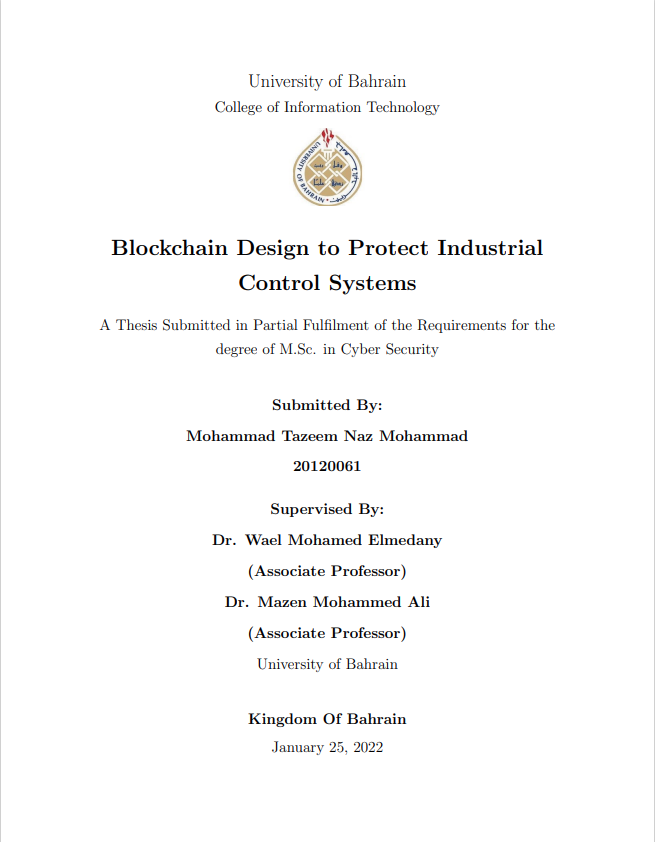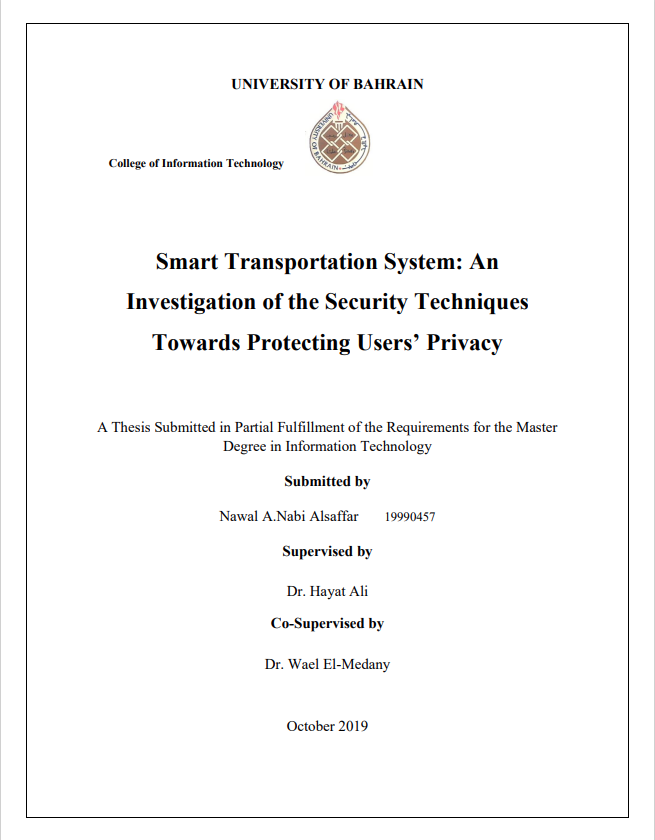المعرف
https://digitalrepository.uob.edu.bh/id/3b3437de-3a19-443b-890d-f9a241e957e4
https://digitalrepository.uob.edu.bh/id/3b3437de-3a19-443b-890d-f9a241e957e4
Blockchain Design to Protect Industrial Control Systems
وكيل مرتبط
Elmedany, Wael Mohamed , مشرف الرسالة العلمية
Ali, Mazen Mohammed, مشرف الرسالة العلمية
اللغة
الأنجليزية
مدى
[3], 8, 78, [2] pages
الموضوع
مكان المؤسسة
Sakhir, Bahrain
نوع الرسالة الجامعية
Thesis (Master)
الجهه المانحه
UNIVERSITY OF BAHRAIN, College of Information Technology
الوصف
Abstract:
Industrial Control Systems (ICS) such as Supervisory Control and Data Acquisition (SCADA) systems play a significant role in many industrial areas. They have started to move increasingly towards utilizing Industrial Internet of Things (IIoT) devices for process control, automation, remote management, and real-time analysis. A large number of cyber attacks are directed towards these systems that can cause critical failures or even unrecoverable damage. One of the many ways of attacking is by data manipulation. Injecting false data could lead to unwanted actions and system failures in ICS. In order to enhance the security of data exchange and communication in the ICS environment, blockchain technology has been utilized in many ways. Data stored in a blockchain could be immutable and provide self-defensive capabilities. However, to fully utilize the benefits of a blockchain, proper consensus mechanism and cryptographic algorithms must be used that are designed for ICS environments with IIoT. This research proposes a design for a Self-Defensive Post-Quantum Blockchain Architecture (SD-PQBA) that adds an additional defense layer to the ICS environments apart from the network security approach. The SD-PQBA design proposed uses a novel consensus mechanism similar to Proof of Authority (PoA) which is named Proof of Derived Authority (PoDA) and a 3-key cryptography scheme that could be implemented to secure sensory data collection by the ICS such as a SCADA system in a smart grid. This approach would open up further opportunities for implementing blockchain solution in other ICS environments. Moreover, securing the IIoT devices used in blockchain environments from hijack, identity theft or other attacks has lacked some attention. This research also suggests a security framework suitable for manufacturing and deploying IIoT devices to ensure their trustworthiness in an ICS environment with a SD-PQBA. Following such a framework and guidelines will ensure minimum security requirements are met for such devices that are usually highly vulnerable and considered an easy target for cyber attacks, especially if deployed in highly critical environments of ICS where the impact of an attack could also cause high damage to public health along with financial losses.
Industrial Control Systems (ICS) such as Supervisory Control and Data Acquisition (SCADA) systems play a significant role in many industrial areas. They have started to move increasingly towards utilizing Industrial Internet of Things (IIoT) devices for process control, automation, remote management, and real-time analysis. A large number of cyber attacks are directed towards these systems that can cause critical failures or even unrecoverable damage. One of the many ways of attacking is by data manipulation. Injecting false data could lead to unwanted actions and system failures in ICS. In order to enhance the security of data exchange and communication in the ICS environment, blockchain technology has been utilized in many ways. Data stored in a blockchain could be immutable and provide self-defensive capabilities. However, to fully utilize the benefits of a blockchain, proper consensus mechanism and cryptographic algorithms must be used that are designed for ICS environments with IIoT. This research proposes a design for a Self-Defensive Post-Quantum Blockchain Architecture (SD-PQBA) that adds an additional defense layer to the ICS environments apart from the network security approach. The SD-PQBA design proposed uses a novel consensus mechanism similar to Proof of Authority (PoA) which is named Proof of Derived Authority (PoDA) and a 3-key cryptography scheme that could be implemented to secure sensory data collection by the ICS such as a SCADA system in a smart grid. This approach would open up further opportunities for implementing blockchain solution in other ICS environments. Moreover, securing the IIoT devices used in blockchain environments from hijack, identity theft or other attacks has lacked some attention. This research also suggests a security framework suitable for manufacturing and deploying IIoT devices to ensure their trustworthiness in an ICS environment with a SD-PQBA. Following such a framework and guidelines will ensure minimum security requirements are met for such devices that are usually highly vulnerable and considered an easy target for cyber attacks, especially if deployed in highly critical environments of ICS where the impact of an attack could also cause high damage to public health along with financial losses.
المجموعة
قالب العنصر
أطروحات


